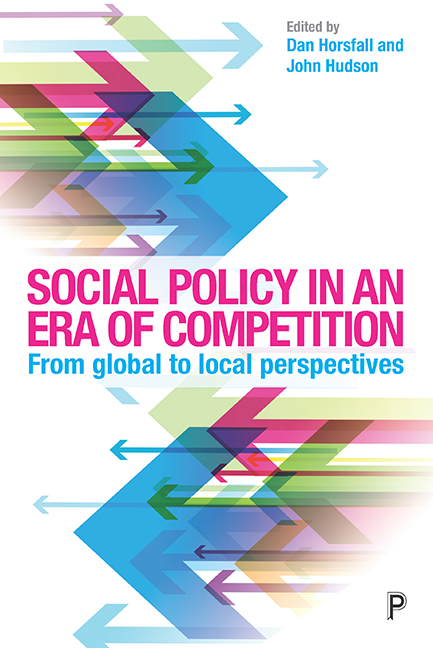Book contents
- Frontmatter
- Contents
- List of figures, tables and boxes
- List of contributors
- List of abbreviations
- Introduction: social policy in an era of competition
- Part One Global competition as the context for welfare
- Part Two The impact of intensifed competition on local governance
- Part Three The reframing of welfare discourses in an era of competition
- Part Four Conclusions
- References
- Index
one - The competition state thesis in a comparative perspective: the evolution of a thesis
Published online by Cambridge University Press: 05 April 2022
- Frontmatter
- Contents
- List of figures, tables and boxes
- List of contributors
- List of abbreviations
- Introduction: social policy in an era of competition
- Part One Global competition as the context for welfare
- Part Two The impact of intensifed competition on local governance
- Part Three The reframing of welfare discourses in an era of competition
- Part Four Conclusions
- References
- Index
Summary
Introduction
The competition state thesis describes a product of globalisation and as such has not remained static since its conception some 25 years ago. The core ideals have held, although the emphasis placed by the authors on certain aspects of the competition state thesis has strengthened over time while other aspects have become comparatively muted. In part this is a natural consequence of the passage of time and increasing understanding of globalisation, as well as the perhaps unexpected level of complexity that has marked an increasingly interconnected world.
This chapter seeks to introduce the competition state thesis, serving the dual purpose of framing the chapter and providing an overall context for the remainder of the book. It then summarises and subsequently extends previous empirical work undertaken using the competition state framework in order to assess the extent to which the core thesis is still relevant today. The competition state may appear a little dated now and its more contentious assertion can be dismissed. However, the core processes identified by Cerny and Evans have clearly influenced welfare policies and ultimately played a part in reshaping welfare states, if not killing them off completely.
The competition state thesis
The key pressures that first Cerny (1990; 1997) and, later, Cerny and Evans (1999; 2003; 2004) and others such as Jessop (2000; 2002) and Fougner (2006) insisted were being faced by national welfare states have indeed come to pass. And yet, many of the assumptions made with regard to the consequences of globalisation, so contentious when first given voice, now seem a little dated. Despite this, many of the predictions made by Cerny and Evans, while both bold and controversial at the time are now taken for granted to such an extent that, with the benefit of hindsight, they appear as statements of the obvious rather than as prescient observations about the evolving nature of the political economy of welfare states.
Globalisation, the decline of the Fordist model of production and the rise of the global knowledge economy have all played their role in producing a more competitive environment in which welfare states operate. As Lunt notes in this collection (Chapter Six), there is an acceptance that not only has competition grown within welfare states but welfare states themselves now compete.
- Type
- Chapter
- Information
- Social Policy in an Era of CompetitionFrom Global to Local Perspectives, pp. 13 - 32Publisher: Bristol University PressPrint publication year: 2017



